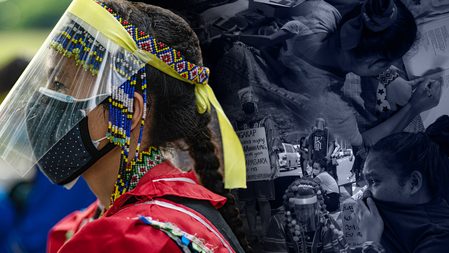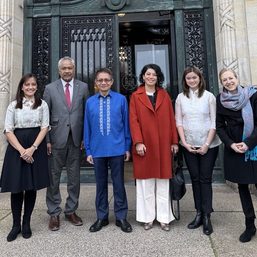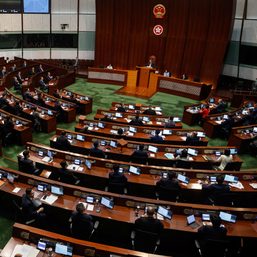SUMMARY
This is AI generated summarization, which may have errors. For context, always refer to the full article.
![[OPINION] Strangers but not spectators: The role of the majority in Lumad rights](https://www.rappler.com/tachyon/2020/11/ispeak.jpg)
The ancestral land, culture, and education of the Lumad, much like other indigenous groups, lie at the very core of their cultural identity. But as their homeland remains ravaged by political unrest since their exodus in 2017, they have had to live out their days in the substandard conditions of evacuation centers. Their stay in the supposedly temporary shelters have now extended to years, with their hope to return to their homeland further dimmed by the global pandemic. What then becomes of their indigenous identity the longer they remain enclosed in graying buildings and makeshift walls, miles and islands away from the familiar green landscapes of their home?
Though I write this as an outsider to their culture, I, who hail from the majority, am by no means exempted from their fight for a life of dignity. As a disadvantaged group, their dwindling numbers need the support of non-Lumad people if their call for genuine reform is to be heard by our government.
Internal displacement is and always has been a human rights issue but there remains a lack of policies present to solidify government response, leaving internally displaced persons like the Lumad to rely on humanitarian aid to survive. Rather than ensuring their protection, the increased proportion of neglect and violence against the Lumad have only become another legacy of this administration, with 584 cases of human rights violations already documented since 2017.
As public support for their plight waxed and waned, however, their access to basic needs and services remains a challenge — one of the most alarming of which is their access to education. The Lumad’s education system includes a specialized curriculum tailor-fit to their context, providing a direct avenue for them to remain in touch with their roots in spite of their diaspora. Within the past years, however, their schools have been shut down and raided, disenfranchising already up to 5,500 students. Meanwhile DepEd has not only been silent on their duty to provide them access to education, but has also set them further back by closing 55 Lumad schools.
It is in this light that solidarity and strength in numbers becomes a vital tool of persuasion. We see the way the #BlackLivesMatter movement in America has magnified in volume in light of the cases of police brutality that have pushed its way into mainstream media. This noise has been instrumental in bringing to light the cases of racial and structural violence experienced by Black people, mobilizing resources, and magnifying their demand for justice and reparation.
We must remember that such violence against marginalized groups have been occurring on our shores too — and with the end to this pandemic still nowhere in sight, it is time their plight is accorded the same urgency.
Protection and the provision of basic needs and services is inextricably linked to the preservation of their cultural identity as a people, and there needs to be an unyielding recognition that a threat to the identity of the Lumad is a threat to us all. In the midst of the pandemic, they remain further deprived of basic needs, proper housing, education, health care, and a sustainable livelihood — things that humanitarian aid can only do so much to cater to.
Solidarity on a national scale thus needs to be strengthened to create consistent and disruptive public outrage in demanding government action. Without this clamor, the plight of marginalized groups like that of the Lumad can easily fade into the background — and with it their demand for aid and policies that can protect and uphold their rights. If we are to help them defend their place in the inclusive development of our nation, they need to be accorded their rightful space in the country’s policies, resources, and decision-making processes.
The first step to this lies in public awareness. As people from the majority who do not live their oppression everyday, it is critical to note that one cannot fight effectively for a cause they are not fully aware of. It is thus of prime importance that we know their story of displacement and diaspora, that we know the cause and their aggressors, and that we know their needs and calls for action. Social media platforms, especially Lumad-owned ones like the Save Our Schools Network and Ako Bakwit, are among the important platforms most in need of public support.
Once we know of their plight, we can then turn our heads to the root of their oppression and actively condemn them. For years, indigenous people have faced the threats to their land and their lives due to private corporations who seek to take their land for economic gain, and military forces that adamantly justify the violence they inflict by red-tagging them. We must know cases like that of Sagittarius Mines Inc. and the role that government plays in subjecting the Lumad to a life of diaspora — especially in the middle of a health crisis where they take advantage of the people’s struggle to mobilize. We must be cognizant of development projects that prioritize economic prosperity over indigenous rights and the state of the environment. This demands us to be firm in our belief that any kind of economic development that stomps on the rights of others is nothing short of privileged and vile, and that true development can only be named as such if it does not exclude others in the process. This comes with sound government response and well-implemented policies that offer them better protection from land-grabbing and solidified assistance in catering to their basic needs.
These steps must also be accompanied by tangible means of supporting the Lumad in the here and now. As the rest of the world struggles to adapt to the new normal, the threat of the virus, hunger, and deprivation still looms for them in evacuation centers. To help them sustain these urgent needs, the Save Our Schools Network and other organizations have opened calls for donations for food, medicine, hygiene kits, learning resources, and cleaning supplies. Several other fundraising efforts have also arisen and are in need of public support, such as the Lumad students’ initiative to sell a photo book entitled “Scent of Rain, Sun, and Soil” — a book that both celebrates Lumad culture and narratives and also serves as a direct means to provide for their daily needs. These efforts remain integral to their survival while institutional support is still being fought for on the negotiating table.
Prior to their displacement, being in their homeland meant protection, education, and a means of subsistence through organic farming. Being ripped away from their land thus meant being deprived of these very things all at the same time. While they are forced into the unfamiliar urban spaces we reside in, they remain steadfast in their call for change. The challenge for us is to not let ourselves remain the passive onlookers. Despite being outsiders to their tribe, we are not and should not be mere spectators to their struggle. – Rappler.com
Angelika Portia Lapidario is a third year student in Development Studies at Ateneo de Manila University. She is also Vice President for Marketing and Promotions of the Development Society of the Ateneo, an organization composed of development-minded individuals working together to forward advocacies and create meaningful change.
Add a comment
How does this make you feel?

![[OPINION] Teaching without schools? Lumad education under lockdown](https://www.rappler.com/tachyon/2020/07/school-closures-bigger-problem-July-17-2020.jpg?fit=449%2C449)
![[OPINION] ‘Some people need killing’](https://www.rappler.com/tachyon/2024/04/tl-some-people-need-killing-04172024.jpg?resize=257%2C257&crop_strategy=attention)
![[Judgment Call] Resisting mob mentality for warrantless arrests](https://www.rappler.com/tachyon/2024/04/judgement-call-mob-mentality.jpg?resize=257%2C257&crop=352px%2C0px%2C720px%2C720px)



There are no comments yet. Add your comment to start the conversation.